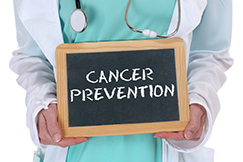NCD Watch
Today’s Lifestyles, Tomorrow’s Cancers
26 Aug 2019 (Mon)
 Cancer is a diverse group of diseases. It begins with gene damage in a cell, causing the normal cells to become abnormal and multiply out of control. Eventually, the abnormal cells invade surrounding tissue and spread to other parts of the body. With different patterns of causation, progression and spread, there are over 100 different types of cancers.
Cancer is a diverse group of diseases. It begins with gene damage in a cell, causing the normal cells to become abnormal and multiply out of control. Eventually, the abnormal cells invade surrounding tissue and spread to other parts of the body. With different patterns of causation, progression and spread, there are over 100 different types of cancers.
Many factors contribute to cell damage and result in cancer. While some risk factors (such as ageing, gender, ethnicity and a family history of cancer) are not avoidable, many cancer-associated lifestyle choices and environmental causes are potentially preventable or modifiable. As the World Health Organization (WHO) estimates, around one third of cancer deaths are due to the 5 leading behavioural and dietary risks: tobacco use, alcohol use, lack of physical activity, low fruit and vegetable intake, and high body mass index. By avoiding risk factors along with implementing existing evidence-based prevention strategies (such as vaccination), between 30–50% of cancers can be prevented.
In Hong Kong, progress in cancer control has been made for reducing incidence and death rates in the last three decades. However, the number of new cancer cases hit a historical high of 31 468 in 2016. The most frequent cancers diagnosed for both genders combined were cancers of the colorectum, lung, breast, prostate and liver. Together, these five leading cancers comprised over half (57.9%) of all new cancers in 2016.
Of most concern, cancer-associated unhealthy lifestyle practices prevail among Hong Kong people. According to the findings of the Population Health Survey 2014/15 by the Department of Health (DH), 50% of local people aged 15–84 were overweight or obese. Among people aged 15 or above, over 90% consumed less than the recommended five servings of fruit and vegetables a day; 13% did not have adequate levels of physical activity to be of benefit to health; about 60% had consumed alcohol in the last 12 months. Furthermore, the Thematic Household Survey conducted by the Census and Statistics Department in 2017 observed that daily cigarette smokers accounted for 10% of all persons aged 15 and over.
The Government promulgated on 26 July this year the “Hong Kong Cancer Strategy” which sets out the strategic direction for cancer prevention and control drawing reference from WHO’s recommendations, international practices and local situations. While the Government will continue to foster cooperation across sectors and work in close partnership with the community and members of the public to build a health-enhancing environment, individuals too can contribute to the fight against cancer by choosing to live in healthy ways, including:-
- Do not smoke, and avoid secondhand smoke
- Avoid alcohol consumption, as alcohol is a cancer-causing substance in human
- Have a balanced diet with at least 5 daily servings of fruit and vegetables, limit the consumption of processed and red meat as well as reduce the consumption of foods high in salt, sugars and fat
- Be physically active in everyday life
- Maintain a healthy body weight and waist circumference
- Get vaccinated against HBV and HPV
- Reduce exposure to environmental carcinogens, such as overexposure to sunlight
- Observe occupational safety and health rules to minimise occupational exposure to cancer-causing substances
- Practise safer sex






































